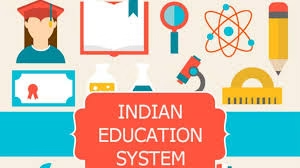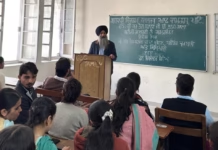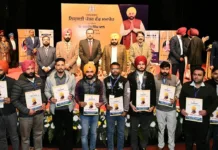

Spotlight on Indian Education: Challenges That Demand Urgent Reforms-Harpreet Singh
Harpreet Singh/ September 12,2025
I have always believed that our classrooms are still stuck in a system that values memorization over understanding. Our education system tests memory, not intelligence. This outdated model stifles creativity and discourages students from thinking critically. Even those who score well often lack true conceptual clarity, which leaves them unprepared to apply knowledge in real-world scenarios.
I often say—our schools and colleges have become factories that produce degrees, not capable individuals. There is so much pressure on grades, rankings, and marks that our students are trained to follow instructions, not to innovate or lead. This is one of the key reasons why many graduates struggle to find meaningful employment.
While the world is moving forward with Artificial Intelligence, Robotics, and cutting-edge innovation, we are still stuck with blackboards and outdated methods. Our students deserve hands-on learning—not just textbooks. I strongly advocate the inclusion of real-world projects, industry internships, and skill-based laboratories in every curriculum to prepare students for the evolving global workforce.
As educators, we must also accept responsibility. A teacher who hasn’t learned in the last 10 years cannot effectively teach the student of today. I firmly believe in continuous professional development and training for teachers. We must stay up-to-date with technology, student psychology, and evolving teaching practices if we wish to inspire and educate the next generation.
The most important aspect of education is the inculcation of values. At one time, values were naturally handed down from generation to generation. Today, these same values are often disregarded as outdated or irrelevant. Each individual tends to form their own beliefs, decide what is right for themselves, and simply “do their own thing.”
Because education has largely failed to give values their rightful place, we see problems emerging all around us, as outlined below:
At the level of the individual
There is a growing lack of clarity about life goals, leading to contradictions and stress. Many people experience purposelessness, disinterest in learning, lack of curiosity, boredom, escapism through television and gaming, self-centeredness, and disregard for others. This results in inactive lifestyles, obesity and related health issues, substance abuse, risky behaviors, depression, suicide, stress, insecurity, loneliness, and various psychological disorders.

At the level of the family
A family is a group of individuals, and the problems at the individual level naturally extend to it. We see increasing issues of mutual misunderstanding, mistrust, insecurity, and generation gaps. There is an all-consuming pursuit of material gain—often by any means—driven by peer pressure and unhealthy competition. Families are shrinking, relationships lack depth, communication among siblings is weakening, and families are breaking apart. Mistrust and insecurity in relationships lead to divorce, family feuds, legal disputes, and in extreme cases, abuse within the family.
At the level of society
We witness rising communal conflicts, exploitation of people, and social strife. Terrorism, violence in various forms, and widespread insecurity are becoming more prevalent.
At the level of nature
There is relentless destruction of the natural environment. Humans fail to coexist harmoniously with nature, resulting in cruelty to animals, climate change, water scarcity, pollution of air, soil, and noise, depletion of natural resources like minerals and fossil fuels, deforestation, and the loss of soil fertility.
Universal and holistic human values can help resolve conflicts at all these levels—individual, family, society, and nature—creating a more balanced and harmonious way of living.
In conclusion, I call upon all education stakeholders—policymakers, school leaders, and institutions—to shift their focus from quantity to quality. We must emphasize values-based skills, innovation, ethics, and purpose-driven learning. Our education system needs to be reimagined from the grassroots, and the time to act is now if we want to keep India competitive on the world stage.
Note: The views expressed by the writer are personal. Harpreet Singh is an Asst. Program Manager, Apex Institute of Technology-CSE, Chandigarh University, Mohali, Punjab










